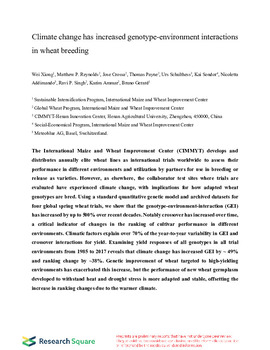Mostrar el registro sencillo del ítem
Climate change has increased genotype-environment interactions in wheat breeding
| Creador: | Wei Xiong |
| Creador: | Reynolds, M.P. |
| Creador: | Crossa, J. |
| Creador: | Payne, T.S. |
| Creador: | Schulthess, U. |
| Creador: | Sonder, K. |
| Creador: | Addimando, N. |
| Creador: | Singh, R.P. |
| Creador: | Ammar, K. |
| Creador: | Gerard, B. |
| Año: | 2020 |
| URI: | https://hdl.handle.net/10883/21039 |
| Lenguaje: | English |
| Editor: | Research Square |
| Copyright: | CIMMYT manages Intellectual Assets as International Public Goods. The user is free to download, print, store and share this work. In case you want to translate or create any other derivative work and share or distribute such translation/derivative work, please contact CIMMYT-Knowledge-Center@cgiar.org indicating the work you want to use and the kind of use you intend; CIMMYT will contact you with the suitable license for that purpose |
| Tipo: | Article |
| Lugar de publicación: | USA |
| DOI: | 10.21203/rs.3.rs-69475/v1 |
| Descripción: | The International Maize and Wheat Improvement Center (CIMMYT) develops and distributes annually elite wheat lines as international trials worldwide to assess their performance in different environments and utilization by partners for use in breeding or release as varieties. However, as elsewhere, the collaborator test sites where trials are evaluated have experienced climate change, with implications for how adapted wheat genotypes are bred. Using a standard quantitative genetic model and archived datasets for four global spring wheat trials, we show that the genotype-environment-interaction (GEI) has increased by up to 500% over recent decades. Notably crossover has increased over time, a critical indicator of changes in the ranking of cultivar performance in different environments. Climatic factors explain over 70% of the year-to-year variability in GEI and crossover interactions for yield. Examining yield responses of all genotypes in all trial environments from 1985 to 2017 reveals that climate change has increased GEI by ~ 49% and ranking change by ~38%. Genetic improvement of wheat targeted to high-yielding environments has exacerbated this increase, but the performance of new wheat germplasm developed to withstand heat and drought stress is more adapted and stable, offsetting the increase in ranking changes due to the warmer climate. |
| Agrovoc: | CLIMATE CHANGE |
| Agrovoc: | WHEAT |
| Agrovoc: | GENOTYPE ENVIRONMENT INTERACTION |
| ISSN: | 2693-5015 |
| Revista: | Research Square |
Ficheros en el ítem
Este ítem aparece en la(s) siguiente(s) colección(ones)
-
Sustainable Intensification
Sustainable intensification agriculture including topics on cropping systems, agronomy, soil, mechanization, precision agriculture, etc.

